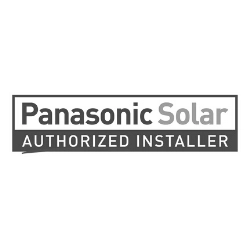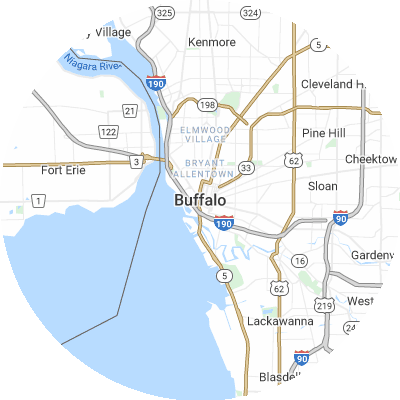Our editorial team is committed to creating independent and objective content focused on helping our readers make informed decisions. To help support these efforts we receive compensation from companies that advertise with us.
The compensation we receive from these companies may impact how and where products appear on this site. This compensation does not influence the recommendations or advice our editorial team provides within our content. We do not include all companies, products or offers that may be available.
Last Updated: February 25, 2025
A rooftop solar array could give you a renewable power source that will pay for itself in time. Solar power can reduce your energy costs and shrink your carbon footprint. However, it's important to choose a reputable solar installer. That’s why we’ve researched the options and assembled a guide to the most reliable solar installation companies in Buffalo. These top companies offer high-quality and reliable services.

Our Rating
User Rating
Reliable customer support
Clear pricing policy
Informative resources
Free quotes
Services Offered

Our Rating
User Rating
Free quotes
Informative resources
Reliable customer support
Clear pricing policy
Services Offered

Our Rating
User Rating
Informative resources
Free quotes
Reliable customer support
Services Offered

Our Rating
User Rating
Clear pricing policy
Services Offered

Our Rating
User Rating
Free quotes
Informative resources
Services Offered

Our Rating
User Rating
Clear pricing policy
Free quotes
Services Offered

Our Rating
User Rating
Reliable customer support
Services Offered
Today's Homeowner looks at dozens of datapoints on solar companies to come up with our data-driven rankings. It's not possible for a company to pay for preferential treatment in our rankings. We look at the following key factors in determining who should top our list:
Putting solar panels on your roof could lower your electricity payments while benefiting the planet by reducing your carbon footprint through renewable energy use. Key considerations when looking at local solar installers are as follows.
It's important to hire a licensed solar installer. This help guarantee that the work is done correctly using the most up-to-date installation methods. New York regulators do not issue licenses to contractors, so you should check with your city or county government for its specific regulations and requirements.
Check review sites like Google Reviews, the Better Business Bureau (BBB), and TrustPilot to see customer feedback about local solar companies. Detailed reviews can help you assess a company's dependability and level of service. Use caution with providers that have very few reviews or mostly negative ones.
Call at least three solar companies for free, itemized quotes. These quotes should explain all costs and specify the solar equipment included. Reviewing multiple quotes helps identify the option that aligns with your budget.
Top-notch solar installations should have strong workmanship and performance warranties. A workmanship warranty covers installation defects, such as poor alignment, cracks in the panels, or poor wiring. A performance warranty ensures a minimum energy output. Comprehensive warranties indicate that a solar company believes in its work.
Solar power can help reduce your electricity costs over time. When weighing solar panel's cost and value, be sure to factor in these considerations.
In Buffalo, solar panels cost an average of $3,650 per kilowatt, with an average system size of 4.6 kilowatts. The typical Buffalo homeowner spends $11,696 on their solar array after federal tax refunds. An estimate from a local provider will consider additional information reflecting your desired system's required preliminary work, panel type, size, and capacity. In some cases, homeowners may prefer to lease solar panels to reduce upfront costs.
Incentive Type: Corporate Tax Credit
Incentive Amount:
$0.01/gallon for each percent of biodiesel
Incentive Type: Sales Tax Incentive
Incentive Amount:
100% exemption
Incentive Type: Sales Tax Incentive
Incentive Amount:
Upon local authorization, 100% exemption from local sales tax
Incentive Amount:
Incentive rates step down over time as MW goals are met. Incentive rates as of 11/27/2019 are:
Residential:
Long Island Region: $0.00/W (MW blocks have been fully subscribed)
Con Edison Region: $0.30/W
Upstate Region: $0.35/W
Low-to-Moderate income customers: $0.80/W (up to 10 kW)
Small Commercial (Non-Residential):Long Island Region: $0.00/W (MW blocks have been fully subscribed)
Con Edison Region: $0.60/W
Up State Region: $0.45/W
Multifamily Affordable Housing Adder: additional $0.40/W (up to 50 kW)
Incentive Amount:
Tier I: 10,000 kWh of expected annual energy production: $3.50/annual kWh
Tier II: 10,000 kWh - 125,000 kWh of expected annual energy production: $1.00/annual kWh
Tier III: 125,000 kWh - 1,000,000 kWh of expected annual energy production: $0.30/ annual kWh
Tier IV: Greater than 1,000,000 kWh of expected annual energy production: $0.15/ annual kWh
These incentives are additive.
Incentive Amount:
Generally speaking, a solar photovoltaic (PV) system can be used to power any household system or appliance that uses electricity. In the smallest case, you can use a solar water heating system.
With home solar panels, you can recoup the cost of the system over time, lower your property's emissions, and be better prepared if there's an outage to the local grid.
It depends on your home's location and the kind of panels you plan to use. Buffalo can experience long, hard winters, so we recommend installing your system in the springtime to maximize your generation for the year.
Yes, it's possible to use home solar energy alongside conventional power sources. In most parts of the country, solar panels are designed to supplement your existing energy sources, so you can reap the savings and environmental benefits that come from using solar energy without having to completely switch over.
You might be pleasantly surprised at how quickly you can get a return on investment from your solar panels. In areas like Buffalo with moderate sunlight, the period could last 18.3 years per 5 kW of power, but may be shorter if you have low electricity costs or a smaller energy capacity.
Of course. Solar panels exist independently from the power grid in Buffalo and will continue to generate power even if the grid is having problems. Keep in mind, however, that a solar system won't take you through a nighttime outage if you don't have a storage system. Your contractor can discuss some economical options to keep your home's power access reliable through the worst conditions, including battery backups or an emergency generator.
The answer ultimately depends on your specific situation. You can take advantage of a federal tax credit of up to 30% of the system's cost, as well as state or local incentives depending on where you are. As for insurance, you'll need to inform your insurance company about your new solar panels. Your premium may increase due to added property values, but you'll have peace of mind if a covered event happens to the system.
The most common types of home solar panels in Buffalo include thin-film, polycrystalline and monocrystalline. Monocrystalline panels are balanced and efficient, while thin-film and polycrystalline panels pair good performance with greater upfront value. Ask your local provider about which solar panels they work with.
